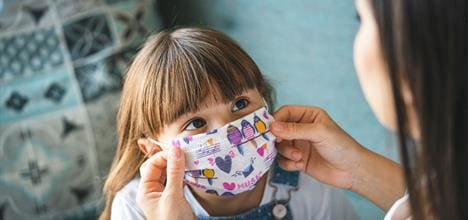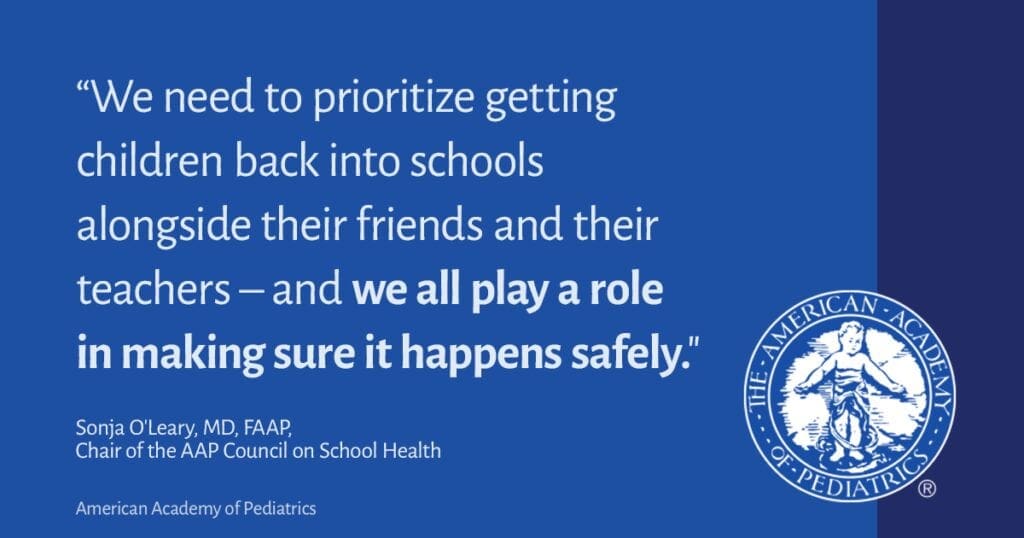Search Posts
Recent Posts
- Writer Herb Weiss’ 45 years of Advocacy on Aging now Archived at Rhode Island College Library Special Collection June 23, 2025
- Providence Biopharma, Ocean Biomedical, Notified of Termination of License Agreements with Brown University, RI Hospital June 23, 2025
- Networking Pick of the Week: Early Birds at the East Bay Chamber, Warren, RI June 23, 2025
- Business Monday: Dealing with Black and White Thinking – Mary T. O’Sullivan June 23, 2025
- Rhode Island Weather for June 23, 2025 – Jack Donnelly June 23, 2025
Categories
Subscribe!
Thanks for subscribing! Please check your email for further instructions.

American Academy of Pediatrics: Open schools with masks on for ALL, vaccinated or not
Photo: HealthyChildren.org
The nation’s pediatricians call for prioritizing in-person learning and advise schools to prepare to address students’ mental health needs
In updated guidance for the 2021-22 school year, the American Academy of Pediatrics strongly recommends in-person learning and urges all who are eligible to be vaccinated to protect against COVID-19.
In addition to vaccinations, the AAP recommends a layered approach to make school safe for all students, teachers and staff in the guidance here. That includes a recommendation that everyone older than age 2 wear masks, regardless of vaccination status. The AAP also amplifies the Centers for Disease Control and Prevention’s recommendations for building ventilation, testing, quarantining, cleaning and disinfection in the updated guidance.
“We need to prioritize getting children back into schools alongside their friends and their teachers — and we all play a role in making sure it happens safely,” said Sonja O’Leary, MD, FAAP, chair of the AAP Council on School Health. “The pandemic has taken a heartbreaking toll on children, and it’s not just their education that has suffered but their mental, emotional and physical health. Combining layers of protection that include vaccinations, masking and clean hands hygiene will make in-person learning safe and possible for everyone.”
AAP recommends universal masking because a significant portion of the student population is not yet eligible for vaccines, and masking is proven to reduce transmission of the virus and to protect those who are not vaccinated. Many schools will not have a system to monitor vaccine status of students, teachers and staff, and some communities overall have low vaccination uptake where the virus may be circulating more prominently.
Research has shown that opening schools generally does not significantly increase community transmission with masking and other safety measures in place. Recently, COVID-19 variants have emerged that may increase the risk of transmission and result in worsening illness. Given the effectiveness of safety precautions when used consistently, children are at higher risk of suffering mental health issues and developmental setbacks if they miss out on in-school learning, according to AAP.
“There are many children and others who cannot be vaccinated,” said Sara Bode, MD, FAAP, chair-person elect of the AAP Council on School Health Executive Committee. “This is why it’s important to use every tool in our toolkit to safeguard children from COVID-19. Universal masking is one of those tools, and has been proven effective in protecting people against other respiratory diseases, as well. It’s also the most effective strategy to create consistent messages and expectations among students without the added burden of needing to monitor everyone’s vaccination status.”
AAP emphasized the need for schools and local communities to use science and data to guide decisions, with the understanding that policies are intended to lessen – but cannot completely eliminate – risk.
Given recent outbreaks of COVID-19 at summer camps, AAP also released updated guidance on safety measures recommended at camps. The guidance here recommends that camp directors adhere to CDC guidance for maintaining healthy environments and operations and promote COVID-19 vaccination for all staff and campers 12 years of age and older who are eligible to receive the vaccine. All campers should wear masks during indoor activities.

Other recommendations included in the AAP guidance are:
- Schools should be prepared to adopt an all-encompassing approach for mental health support.
- Adequate and timely COVID-19 testing resources must be available and accessible.
- Strategies should be revised and adapted depending on the level of viral transmission and test positivity rate throughout the community and schools..
- School policies should be adjusted to align with new information about the pandemic; administrators should refine approaches when specific policies are not working.[i]
- School districts must be in close communication and coordinate with state and/or local public health authorities, school nurses, local pediatric practitioners, and other medical experts.
AAP also urges families to call their pediatrician and have children caught up on all vaccines they may have missed during the pandemic. This includes getting a vaccine to protect against influenza, which, like COVID-19, can cause severe illness and death.
“The last thing we want as we come out of this pandemic is an outbreak of another vaccine-preventable disease,” Dr. O’Leary said. “Now is the time for all of us to work together to keep our kids healthy and safe. Your pediatrician can help families who have any questions or concerns about returning to the classroom.”
The American Academy of Pediatrics is an organization of 67,000 primary care pediatricians, pediatric medical subspecialists and pediatric surgical specialists dedicated to the health, safety and well-being of infants, children, adolescents and young adults.

